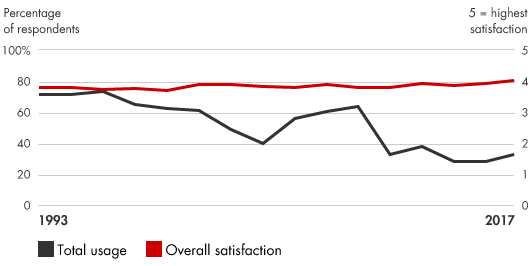Management Tools
Total Quality Management (TQM) is a systematic approach to quality improvement that marries product and service specifications to customer performance. TQM then aims to produce these specifications with zero defects. This creates a virtuous cycle of continuous improvement that boosts production, customer satisfaction and profits.
Usage and satisfaction among survey respondents

How Total Quality Management works:
In order to succeed, TQM programs require managers to:
Assess customer requirements
- Understand present and future customer needs
- Design products and services that cost-effectively meet or exceed those needs
Deliver quality
- Identify the key problem areas in the process and work on them until they approach zero-defect levels
- Train employees to use the new processes
- Develop effective measures of product and service quality
- Create incentives linked to quality goals
- Promote a zero-defect philosophy across all activities
- Encourage management to lead by example
- Develop feedback mechanisms to ensure continuous improvement
| RELATED TOPICS | HOW BAIN CAN HELP |
|---|---|
|
Companies use Total Quality Management to:
TQM improves profitability by focusing on quality improvement and addressing associated challenges within an organization. TQM can be used to:
- Increase productivity
- Lower scrap and rework costs
- Improve product reliability
- Decrease time-to-market cycles
- Decrease customer service problems
- Increase competitive advantage
Selected references
Besterfield, Dale H., Carol Besterfield-Michna, Glen Besterfield, and Mary Besterfield-Sacre. Total Quality Management. 3d ed. Prentice Hall, 2002.
Camison, Cesar. “Total Quality Management and Cultural Change: A Model of Organizational Development.” International Journal of Technology Management 16, nos. 4-6, 1998, pp. 479–493.
Choi, Thomas Y., and Orlando C. Behling. “Top Managers and TQM Success: One More Look After All These Years.” Academy of Management Executive, February 1997, pp. 37–47.
Dahlgaard, Jens J., Kai Kristensen, and Ghopal K. Khanji. Fundamentals of Total Quality Management. Routledge, 2005.
Deming, W. Edwards. Quality, Productivity, and Competitive Position. MIT Press, 1982.
Feigenbaum, Armand V. Total Quality Control. 4th ed. McGraw-Hill, 1991.
Gale, Bradley T. Managing Customer Value: Creating Quality and Service That Customers Can See. Free Press, 1994.
Goetsch, David L., and Stanley B. Davis. Quality Management for Organizational Excellence: Introduction to Total Quality. 8th ed. Prentice Hall, 2015.
Grant, Robert M., Rami Shani, and R. Krishnan. “TQM’s Challenge to Management Theory and Practice.” MIT Sloan Management Review, Winter 1994, pp. 25–35.
Imai, Masaaki. Kaizen: The Key to Japan’s Competitive Success. Random House, 1986.
Juran, J. M. Juran on Quality by Design: The Next Steps for Planning Quality into Goods and Services. Free Press, 1992.
Malcolm Baldrige National Quality Award. www.nist.gov/baldrige
Walton, Mary. The Deming Management Method. Perigee, 1988.